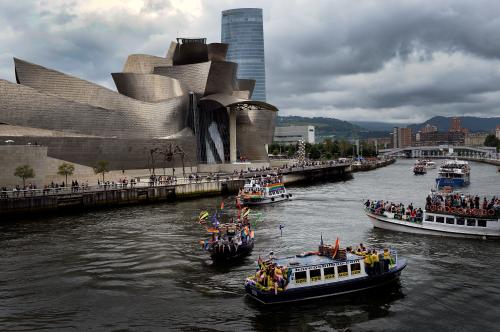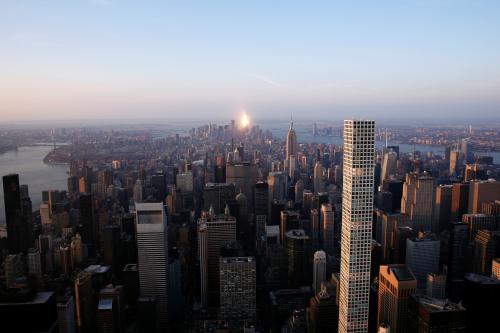This blog has been cross-posted with the Italian Institute for International Political Studies.
City leaders are confronting one of the most urgent crises in their careers. As they scramble to protect their citizens and communities while COVID-19 ripples throughout the world, the idea of sustainable development and meeting the Sustainable Development Goals (SDGs) by 2030 may seem irrelevant to their current demands. Yet the very principles that drew mayors and local governments to the SDGs, and elevated the importance of local leadership to global progress, may be just the thing for enabling a rapid path forward in the aftermath of COVID-19.
Prior to the current crisis, a groundswell of local leadership was demonstrating the importance of local contributions to sustainable development. In the summer of 2018, several cities published reports of their local progress on the SDGs, with New York City presenting its Voluntary Local Review (VLR), echoing the official format used by countries to report their nation’s progress at the U.N.
The idea stuck. Within less than a year, more than 20 other cities had committed to or completed a VLR. At the World Urban Forum in February 2020, multiple sessions focused on scaling VLRs to every continent and hundreds of cities.
VLRs struck a chord with mayors and local governments: Here was a problem-solving tool that facilitates the use of evidence and a common language to “multi-solve” and articulate a coherent vision, enabling exchanges with other cities, partnerships with other sectors, and opportunities for investors.
Then COVID-19 struck.
It’s much too early to know the full extent of the economic, social, and psychological dislocation this crisis will cause. But it’s clear that mayors and city officials are on the front lines, with implications both broad and deep for local governments.
At the same time, while the top priority is to stop the virus and stabilize economies and communities, even U.N. Secretary General Guterres has pointed to the 2030 Agenda as a natural organizing principle once the world can shift its focus to recovery.
At this early juncture, it’s risky to hazard what that will mean. National leaders, mayors, and city governments will be faced with a new and unpredictable set of challenges. Leaders will encounter immense pressure to develop new policy solutions and surge financial resources at warp speed in a chaotic environment.
The ambitious quantitative benchmarks of the SDGs may now look unreachable or even unreasonable. Targets asking for a 50 percent reduction in those living under the national poverty line or achieving full employment by 2030 take on a new light, given the hit that economies are experiencing. It’s fair to ask: What might the 2030 Agenda offer to cities in such a situation?
The answer likely lies in the essential principles at the core of the SDGs and the 2030 Agenda:
- Leave no one behind. The SDGs ask policymakers and decisionmakers to focus on reaching the most vulnerable and furthest behind first. In the aftermath of COVID-19, this will be fundamental for achieving an equitable recovery. Mayors and city officials will be determined to reknit the social fabric that has been frayed and torn, intent on rebuilding their communities. Using disaggregated data to focus policy interventions on the demographic groups and neighborhoods that are most affected will offer one of the best chances for rapidly leapfrogging to recovery.
It will also be crucially important for voices from these groups to be part of the public policy decisions that take place. After hurricane Katrina, the city of New Orleans had to go through three different planning processes before finally producing a plan for its future that was not a political failure. The third attempt stuck in part because the process for producing it prioritized widespread participation and equitable decisionmaking.
- Point toward a “North Star.” The mobilizing power of the SDGs comes in part from their time-bound nature and their focus on community-level outcomes. That clarity of purpose—how far by when—provides a platform for organizing participation, resources, and support by stakeholders and citizens themselves. While cities may feel the need to adjust their targets, having quantitative, time-limited benchmarks as part of their forward-looking plans will drive an emphasis on data and measurement, encouraging and strengthening evidence-based policymaking to identify and scale the most effective interventions.
- Embrace interdependence. The SDGs ask policymakers to advance progress on social, economic, and environmental dimensions at once. City leaders used VLRs to break down internal barriers among different offices and officials, enabling improved policy coherence and the chance to solve multiple problems through integrated approaches. Challenges related to climate change and biodiversity will not disappear even as policymakers are seized with protecting the health of their constituents and addressing their economic disruptions—the SDGs encourage city leaders to think of these challenges as linked and requiring systemic approaches.
- Develop unusual partnerships. City leaders love the connective properties of the 2030 Agenda. The SDGs are a lingua franca that offer the basis for new partnerships with businesses, universities, civil society, and local philanthropy. The city of Los Angeles, for example, has benefited from support from the Conrad Hilton Foundation, and developed partnerships with four local universities. City leaders will need these types of new and creative partnerships to enable a rapid recovery, with the aim of building back better.
A post-COVID-19 recovery, whenever it begins, will take place in a chaotic environment marked by uncertainty, disruption, and some measure of devastation. Perhaps the situation may render the idea of a VLR obsolete, retired as a tool for a different time and purpose. Or perhaps it will adapt or morph into something altogether different after all, innovation is part of its DNA.
Yet the crisis clearly shows that business as usual will not be adequate to the task. The planet is experiencing too many shifts, disruptions, and catastrophes. Two truths seem unambiguous: Local leaders will remain fundamental to achieving global progress on sustainable development, and the key tenets of the SDGs will remain relevant, useful, and essential to catalyzing a recovery that can lead to transformation.
The Brookings Institution is committed to quality, independence, and impact.
We are supported by a diverse array of funders. In line with our values and policies, each Brookings publication represents the sole views of its author(s).






Commentary
City leadership on sustainable development in the era of COVID-19
April 20, 2020